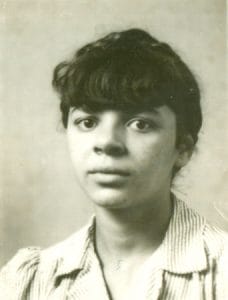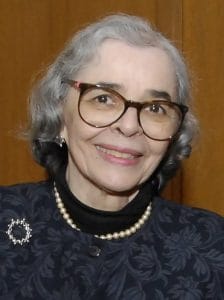Her father was a surgeon, but died when she was a toddler. Hamburg wanted to be a doctor too, but didn’t think she would be able to, only in part due to being a female born in 1923. As she was nearing college age, of the “Seven Sisters” — the elite women’s colleges in the northeast: Mount Holyoke, Vassar, Wellesley, Smith, Radcliffe, Bryn Mawr, and Barnard — only Vassar had not “integrated” — started to accept African-American students. “I was informed by a Methodist minister that at Vassar they wanted to find a black student,” she said in a 2011 interview, “and he was going to suggest me.” She was accepted as the first “openly black” student at the college: at least one other had graduated in the 1800s, passing as white. Vassar didn’t assign her a roommate at first, “because they didn’t know how I would work out,” Hamburg said later. “Some students have told me that they really believed there was no such thing as an intelligent Negro,” she told Vassar Quarterly in 1946. “They had never known one.”

She not only “worked out,” Hamburg was accepted as the first black female at the Yale Medical School. “It wasn’t a very big deal to be an African American at Yale, but it was much more of a challenge to be a woman there,” she said in another interview. “I didn’t notice this at Vassar because it was all women, but in medical school, a woman, when a question was tossed out, would answer it, and it would be as if talking into the wind; hadn’t happened. Later on a man would say the same thing — the same thing! — and they’d say, God, John, that was so fabulous.” She went on “a campaign” to demand more respect for women at the school — and the next two black doctors to graduate from Yale were also women. Hamburg went on to hold professorships at the Stanford School of Medicine, Harvard Medical School, Mount Sinai School of Medicine, and was a DeWitt Wallace Distinguished Scholar at Weill Cornell Medical College. Hamburg had thought she wanted to be a pediatrician, but instead became a psychiatrist, and in the 1960s and 1970s was the leading advocate for peer counseling for children. That era, she said later, was when Harvard psychologist Timothy Leary was telling students to “turn on, tune in, drop out” — with drugs like LSD. “I realized that it was not going to be particularly welcomed by the students to say to them ‘You know, the things you’re doing are crazy and you’re getting to be basket cases’,” she said in yet another interview. “I felt that that was not a fruitful approach.”

Hamburg was also the co-editor of the 1998 book Violence in American Schools, which explored how to stop school shootings. A year later, when Colorado’s Columbine High School shooting happened, she was asked what parents could do about such violence. “They should recognize they’re smaller players in the lives of their kids than they ever have been, with the impact of peers, TV and the Internet,” she said. “But it’s very important to be warm, to be attentive, to listen, to teach them respect, and to deal with them in a mode — when kids get angry and yell — that exemplifies conflict resolution at home.” Dr. Beatrix “Betty” Hamburg died on April 15, from Alzheimer’s disease. She was 94.
